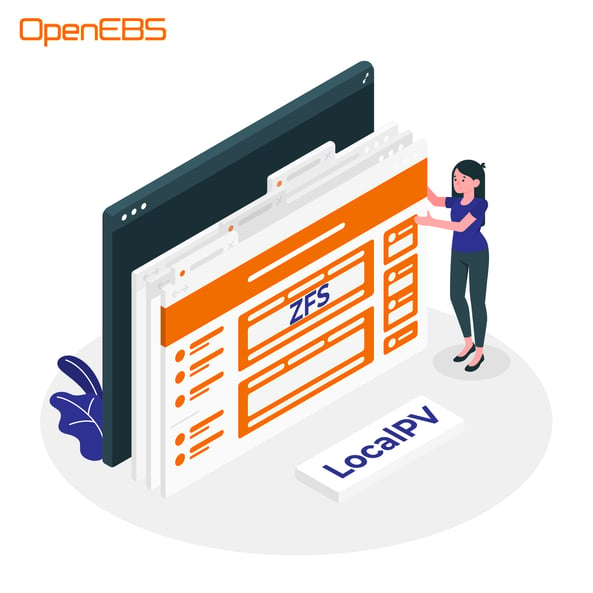Updated September 7th 2021: This blog is updated with the the latest guide on OpenEBS Local PV, please refer to https://github.com/openebs/dynamic-localpv-provisioner.
Before reading this post, please read my previous post for instructions on setting up the ZFS-LocalPV for dynamically provisioning the volumes on the ZFS storage. Here, we will focus on how we can set up the Prometheus alert for Provisioned volumes when space utilization has reached a critical point.
 Monitoring ZFS-LocalPV Volumes
Monitoring ZFS-LocalPV Volumes
Prerequisite
Make sure you are using k8s version 1.15+ to access the CSI volume metrics.
Setup helm
This step uses helm as the Kubernetes package manager. If you have not setup the helm, execute the below configuration. Otherwise, you can move on to the next step.
$ helm version
Client: &version.Version{SemVer:"v2.16.1", GitCommit:"bbdfe5e7803a12bbdf97e94cd847859890cf4050", GitTreeState:"clean"}
Server: &version.Version{SemVer:"v2.16.1", GitCommit:"bbdfe5e7803a12bbdf97e94cd847859890cf4050", GitTreeState:"clean"}
$ helm init
Tiller (the Helm server-side component) has been installed into your Kubernetes Cluster.
Please note: by default, Tiller is deployed with an insecure 'allow unauthenticated users' policy.
To prevent this, run `helm init` with the --tiller-tls-verify flag.
For more information on securing your installation see: https://docs.helm.sh/using_helm/#securing-your-helm-installation
$ kubectl create serviceaccount --namespace kube-system tiller
serviceaccount/tiller created
$ kubectl create clusterrolebinding tiller-cluster-rule --clusterrole=cluster-admin --serviceaccount=kube-system:tiller
clusterrolebinding.rbac.authorization.k8s.io/tiller-cluster-rule created
$ kubectl patch deploy --namespace kube-system tiller-deploy -p '{"spec":{"template":{"spec":{"serviceAccount":"tiller"}}}}'
deployment.extensions/tiller-deploy patched
Install Prometheus Operator
Once the helm is ready and the related tiller pods are up and running, use the Prometheus chart from the helm repository.
$ helm install stable/prometheus-operator --name prometheus-operatorCheck all the required pods are up and running
$ kubectl get pods -l "release=prometheus-operator"
NAME READY STATUS RESTARTS AGE
prometheus-operator-grafana-85bb5d49d-bffdg 2/2 Running 0 2m21s
prometheus-operator-operator-64844759f7-rpwws 2/2 Running 0 2m21s
prometheus-operator-prometheus-node-exporter-p9rl8 1/1 Running 0 2m21sSetup alert rule
Check all the rules available in the system :-
$ kubectl get PrometheusRule
NAME AGE
prometheus-operator-alertmanager.rules 4m21s
prometheus-operator-etcd 4m21s
prometheus-operator-general.rules 4m21s
prometheus-operator-k8s.rules 4m21s
prometheus-operator-kube-apiserver-error 4m21s
prometheus-operator-kube-apiserver.rules 4m21s
prometheus-operator-kube-prometheus-node-recording.rules 4m21s
prometheus-operator-kube-scheduler.rules 4m21s
prometheus-operator-kubernetes-absent 4m21s
prometheus-operator-kubernetes-apps 4m21s
prometheus-operator-kubernetes-resources 4m21s
prometheus-operator-kubernetes-storage 4m21s
prometheus-operator-kubernetes-system 4m21s
prometheus-operator-kubernetes-system-apiserver 4m21s
prometheus-operator-kubernetes-system-controller-manager 4m21s
prometheus-operator-kubernetes-system-kubelet 4m21s
prometheus-operator-kubernetes-system-scheduler 4m21s
prometheus-operator-node-exporter 4m21s
prometheus-operator-node-exporter.rules 4m21s
prometheus-operator-node-network 4m21s
prometheus-operator-node-time 4m21s
prometheus-operator-node.rules 4m21s
prometheus-operator-prometheus 4m21s
prometheus-operator-prometheus-operator 4m21sYou can edit any of the default rules or create a new rule to get the alerts. Below is a sample rule to start generating alerts when available storage space is less than 10%.
apiVersion: monitoring.coreos.com/v1
kind: PrometheusRule
metadata:
labels:
app: prometheus-operator
chart: prometheus-operator-8.5.4
heritage: Tiller
release: prometheus-operator
name: prometheus-operator-zfs-alertmanager.rules
namespace: default
spec:
groups:
- name: zfsalertmanager.rules
rules:
- alert: ZFSVolumeUsageCritical
annotations:
message: The PersistentVolume claimed by in Namespace is only % free.
expr: |
100 * kubelet_volume_stats_available_bytes{job="kubelet"}
/
kubelet_volume_stats_capacity_bytes{job="kubelet"}
<10
for: 1m
labels:
severity: critical
Now apply the above YAML so that Prometheus can fire the alerts when available space is less than 10%.
Check the Prometheus alert
To view the Prometheus web UI, you must expose it through a Service. A simple way to accomplish this is to use a Service of type NodePort.
$ cat prometheus-service.yaml
apiVersion: v1
kind: Service
metadata:
name: prometheus-service
spec:
type: NodePort
ports:
- name: web
nodePort: 30090
port: 9090
protocol: TCP
targetPort: web
selector:
prometheus: prometheus-operator-prometheusApply the above YAML
$ kubectl apply -f prometheus-service.yaml
service/prometheus-service createdNow you can access the alert manager UI via “node’s-external-ip:30090”.
$ kubectl get nodes -owide
NAME STATUS ROLES AGE VERSION INTERNAL-IP EXTERNAL-IP OS-IMAGE KERNEL-VERSION CONTAINER-RUNTIME
gke-zfspv-pawan-default-pool-3e407350-xvzp Ready <none> 103m v1.15.4-gke.22 10.168.0.45 34.94.3.140 Ubuntu 18.04.3 LTS 5.0.0-1022-gke docker://19.3.2Here, we can access the alert manager via URL: http://34.94.3.140:30090/
Check the Alert Manager
To view the Alert Manager web UI, expose it through a Service of type NodePort.
$ cat alertmanager-service.yaml
apiVersion: v1
kind: Service
metadata:
name: alertmanager-service
spec:
type: NodePort
ports:
- name: web
nodePort: 30093
port: 9093
protocol: TCP
targetPort: web
selector:
alertmanager: prometheus-operator-alertmanagerApply the above YAML
$ kubectl apply -f alertmanager-service.yaml
service/alertmanager-service createdNow you can access the alert manager UI via “node’s-external-ip:30093”.
$ kubectl get nodes -owide
NAME STATUS ROLES AGE VERSION INTERNAL-IP EXTERNAL-IP OS-IMAGE KERNEL-VERSION CONTAINER-RUNTIME
gke-zfspv-pawan-default-pool-3e407350-xvzp Ready <none> 103m v1.15.4-gke.22 10.168.0.45 34.94.3.140 Ubuntu 18.04.3 LTS 5.0.0-1022-gke docker://19.3.2Again, we can access the alert manager via URL: http://34.94.3.140:30093/.
I hope you found this post to be useful. Feel free to contact me with any feedback or questions by using the comment section below.






Game changer in Container and Storage Paradigm- MayaData gets acquired by DataCore Software
Don Williams
Don Williams
Managing Ephemeral Storage on Kubernetes with OpenEBS
Kiran Mova
Kiran Mova
Understanding Persistent Volumes and PVCs in Kubernetes & OpenEBS
Murat Karslioglu
Murat Karslioglu